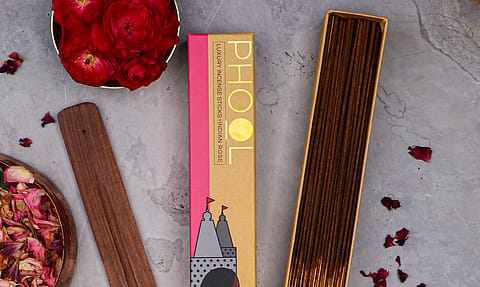Incense sticks from ritual flowers: How start-up 'Phool' monetises temple waste
From its conception in the backdrop of a filthy Ganga river, to roping in a flurry of investors, Phool’s quest is to bring the fragrance industry to the fore.

The ghats — a series of steps leading to Ganga — in Bithoor, a suburb of Kanpur, in eastern Uttar Pradesh, do not conjure up a tranquil picture of a riverine. In fact, it is a grotesque and repulsive sight, with human and industrial waste dumped into the holy river, stench of the degrading waste hanging heavy in the air.
However, it was at this very mucky ghat where destiny presented Ankit Agarwal — a native of Kanpur and an engineering graduate — what to tread on. This watershed moment is no less than a folklore at Phool, a "flowercycling" organisation, which is the culmination of that epiphany. Apurv Misal, head of marketing and sales at Phool, tells Fortune India the angst of Ankit. “Ankit’s friend, Jakub, from Czech Republic, was in town in 2015, and he expressed a desire to visit the ghats,” he tells. The two friends set upon an early morning sortie to Bithoor on Makar Sakranti — an ancient Indian festival celebrating the conclusion of the winter solstice.
Upon reaching the ghats, they were appalled to see devotees performing their ablutions, drinking and filling their containers with that murky, contaminated water. Upon introspecting the dreadful state of affairs, Ankit’s first retort was to blame the plethora of leather tanneries, industrial units, and the sewage system that unabashedly dump their waste into the river. It was Jakub, who exhorted a crestfallen Ankit to alleviate the dilapidated state of a river revered in the Hindu religion, in whatever capacity he could.
Six years later, Phool (which literally translates to flower), has metamorphosed from that dialogue. It upcycles 4.7 tonnes of floral waste discarded by temples every day, and uses it to manufacture charcoal-free, organic incense sticks. It has consistently achieved a near three-fold growth in the past two years, and has garnered interest from a clutch of marquee investors, having raised $2 million in a seed round from IAN Fund, Social Alpha (FISE), Draper Richards Kaplan Foundation, and IIT Kanpur — whose incubation cell has been a patron of Phool’s endeavours, and even gave them a space to operate from. In October, Alia Bhatt also came on board as an investor. Among its advisory board are Ameya Velankar, head of marketing, Uber India and SA; and Prashanth Venkatesh, marketing director, brand Unilever and sustainability at Unilever.
Phool’s success is a hard-earned one for those who inexorably believed in it. “Among the many ideas that were experimented with, incense sticks stuck after a lot of trials and tribulations,” tells Apurv, as his collaborators, Ankit and Prateek Kumar, dabbled with several prospects in a makeshift laboratory. Even after chalking out a presumably viable business model in July 2017, its detractors were quick to dismiss its business model right from its genesis.
The very idea of recycling floral waste seemed preposterous to temple patrons, and it took a lot of cajoling for them to part with their waste. The company adapted a D2C model by offering its products online in 2018, which was also ridiculed, since it faced an onerous task of carving a space in a rigid market dominated by legacy manufacturers such as Cycle, and selling a product which is largely sold in next-door mom-and-pop stores, where customers can take a whiff.
What sets Phool apart, which compelled people into buying its products, is taking the very notion of incense sticks out of the pantheons and temples. “We offer sticks made of citronella as a mosquito repellant; our vetiver-made sticks are positioned as a cooling agent, for instance,” tells Apurv. It also makes incense sticks sans charcoal, artificial fragrances and chemicals. “The reason why people feel heavy-headed after lighting charcoal-based incense sticks is because it is laced with substandard chemicals,” he avers. The vetiver sticks also elicits a feeling of nostalgia of the smell of the erstwhile air cooler, and its jasmine-made sticks are reminiscent of mothers putting jasmine in their hair, says Apurv.
Recommended Stories
The Covid-19 pandemic engulfed the nation, and Phool, at a time when it was putting money into marketing, and getting the word out to the swathes of people across the nation. The fiat of a nationwide lockdown — which confined everyone but frontline workers to their homes — bludgeoned Phool. It employs and facilitates social security to more than 160 women in its factories, who hitherto were engaged in manual scavenging. “People couldn’t get our products because the supply chains came to a halt; there was a time where we thought we would have to shut shop,” recalls Apurv.
The company operated on a shoestring budget to avert its coffers from running out. “We made cash runways; the entire corporate team of 25 people forewent their salaries for two months, for the sake of our workers; we cut down on a majority of overhead expenses,” tells Apurv. A silver lining in Phool’s darkest hours was the relentless support by customers. “We received emails from customers, who told us to not fret; they will wait for our products when restrictions ease.”
The affirmation extended by customers instilled belief in what Phool was doing, and in tandem with a methodical and prudent planning, today it lives to tell the tale. It is on course to launch f-leather — an in-house designed faux leather which is made of floral waste and stubble, which, as Apurv puts it, “is animal and cruelty-free”. It has plans to source raw materials from Mathura, and is in preliminary talks with religious sites in Bengaluru and Tirupati. Phool has a nascent presence in brick-and-mortar stores, and is also espousing to ramp up that presence.